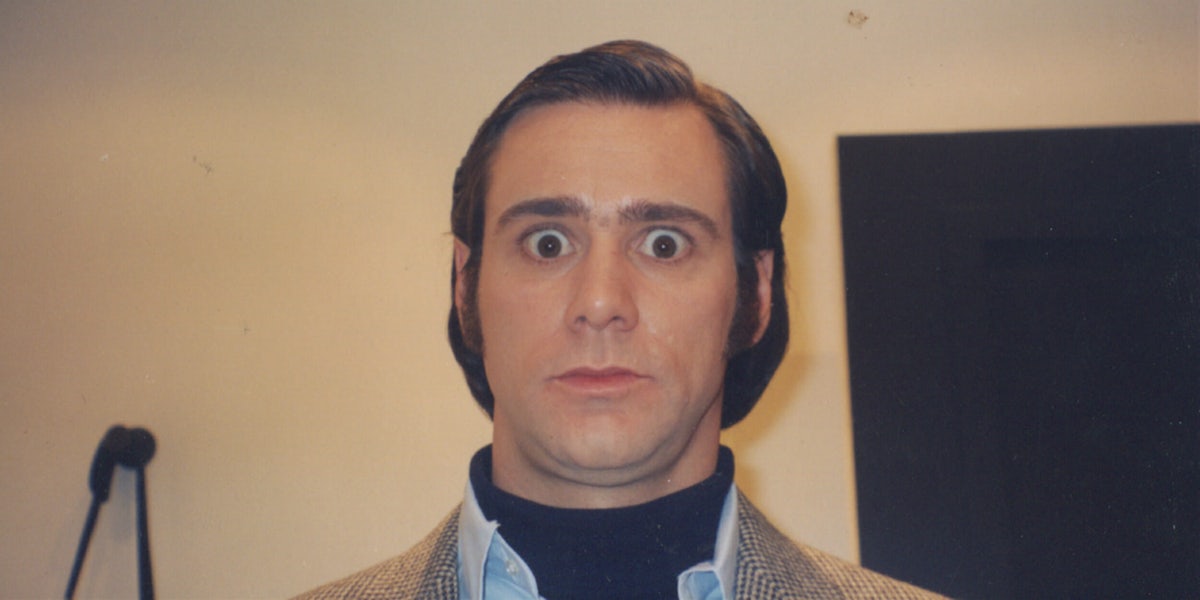The 1999 film Man on the Moon, in which Jim Carrey portrays subversive comedian Andy Kaufman, hasn’t necessarily experienced a cult following or shown up in anniversary-year think pieces. But, as we see in Netflix documentary Jim & Andy: The Great Beyond—Featuring a Very Special, Contractually Obligated Mention of Tony Clifton, there was another story running parallel.
In the long-shelved footage, we see Carrey, then at the height of fame, thoroughly immersing himself in Kaufman over the course of four months. The footage, shot by Kaufman’s girlfriend Lynne Margulies (played in the film by Courtney Love), is woven into filmmaker Chris Smith’s present-day interview with Carrey, which is filled with esoteric musings on life and psyche. He claims that before going into production, he tried to speak with Kaufman “telepathically,” and that the comic, who passed away in 1984, came to him and said, “Sit down, I’ll be doing my movie.”
There’s plenty of room for eye-rolling, especially considering the film revolves around a white male comic ruminating on the misunderstood brilliance of another white male comic, the line between the two personalities erased so that we see the true genius of the performance. I mostly cringed through the on-set footage; Carrey’s declaration that he wasn’t entirely “in control” during filming feels like a bit of a cop-out, especially when he’s seen being obstinate or occasionally violent as “Andy.” Cast members and director Milos Forman are visibly frustrated. Crew members appear tense. Carrey also talks to Kaufman’s sister and father in character and reportedly got to meet the estranged daughter Kaufman never did. It all feels a bit morally compromised.
While Kaufman excelled in blurring the line between real and fake—Carrey also portrays Kaufman’s combative, unfunny lounge singer persona Tony Clifton—some of his stunts have not aged well. When explaining why he wanted to wrestle women, Kaufman made fun of the growing women’s movement of the late ‘70s and jested that they belonged in the kitchen. It was a bit made to amp up wrestling fans, and whether Kaufman was just “performing” is a question that has been exhaustively explored, but right now that divide is seeing added scrutiny in comedy.
However, there’s not a lot of scrutiny in Jim & Andy. Carrey’s the only present-day interview we get, so there’s no real objectivity or point of view, and Smith doesn’t ask any hard questions about Kaufman’s button-pushing. He lets Carrey ramble about the abstract and the “universe, man,” to the point where you wonder if it’s another bit or Carrey’s worldview.
But Smith also uses Carrey’s pre-MOTM films like The Mask and The Truman Show to subtly play with issues of identity, performance, and fame. And perhaps that’s the bigger, more interesting thread. Comedians’ need for attention and laughter is a blessing and curse, and Carrey does not deny that it’s what he was after. He also recognizes the facade, and that he did go too far in his method acting, and that fame can swallow you whole if you let it. You can either be your true self or “fall into your grave grasping onto a character that you never were.”
Still not sure what to watch on Netflix? Here are our guides for the absolute best movies on Netflix, must-see Netflix original series and movies, and the comedy specials guaranteed to make you laugh.
